- Home
- Lisa Kleypas
Midnight Angel Page 29
Midnight Angel Read online
Page 29
Obeying her husband's nudge, Tasia let go of him and went toward Nikolas. She began to pull the hood of the mantle over her head. All at once she stopped as she saw a shadow in the sitting room and heard the sound of a carpet-muffled footstep.
The others heard at the same time. Luke was the first to react, moving into the sitting room with quick, noiseless strides. He grabbed the intruder, an eavesdropping sentry, and clapped his hand over the man's mouth. The sentry struggled so hard that they both slammed sideways into the wall. Gamely Luke held on, grunting with the effort of subduing the intruder. One shout would alarm the entire houseful of guards, and ruin all chances of getting Tasia out of Russia.
Luke was dimly aware of Nikolas's approach. There was a flash of steel, and a silent, startling explosion of violence, and then the man stopped struggling in his arms, beginning to sag heavily. Gasping for breath, Luke realized that Nikolas had stabbed the sentry and had shoved a wad of fabric—a towel, or perhaps a coat—over the fatal chest wound to staunch the flow of blood. The soldier gave one least death convulsion in Luke's arms.
“Don't let his blood splash on the carpet,” Nikolas muttered, easing the limp body away from him.
Luke felt sick. He caught a glimpse of the women's faces: Marie's tense and pale, Tasia's blank. Resolutely he swallowed back the twinge of nausea and helped Nikolas carry the dead sentry out of the suite. Several doors along the hallway there was a room piled with rows of paintings and unused furniture. They worked quickly, depositing the body in the corner and concealing it with a desk and a stack of framed canvases.
“Another skeleton for the family closet,” Nikolas said facetiously, taking a critical glance at their handiwork. His face was like granite, his yellow eyes eerily flat. Luke's first reaction was to despise Angelovsky for his callousness, but he noticed that Nikolas had clenched his fist so tightly that his knuckles formed white peaks amid the bloodstains on his skin. “You're a fool if you think the sight of death disturbs me,” Nikolas murmured. “It used to, but now it's the absence of feeling that bothers me.”
Luke eyed him skeptically. “Whatever you say.”
“Let's go,” Nikolas said. “All this scuffling, and moving furniture—soon they'll discover the soldier is missing and we'll have an entire regiment up here.”
Tasia was very calm as she descended the stairs on Nikolas's arm. She kept her head bent, as a sorrowful mother might, letting the hood of the mantle drape over her face. The death of the soldier had shocked her into a state of absolute clarity. She took strength from Nikolas's cold determination. She was leaving the palace where Misha had died and her strange journey had begun, except now there was Luke, and a home to which she desperately wanted to return. Inside the cloak, she slid her free hand over her abdomen, where her unborn baby nestled. God, just give me the chance to go back, let us all reach safety…Her lips moved in a soundless prayer as she walked with Nikolas through the hall of soldiers and felt their gazes on her.
Someone stepped in front of them, forcing them to halt. Tasia curled her fingers into Nikolas's wrist. He didn't flinch from the bite of her nails. “Colonel Radkov?” Nikolas said coolly. “Is there something you want?”
“Yes, Your Highness. Madam Kaptereva is renowned as a woman of surpassing beauty. I would like to be honored with a brief glimpse of her.”
Nikolas's reply dripped with contempt. “The kind of request a stupid peasant would make. Have you no respect for a mother's grief, that you would insult her in such a manner?”
There was a long, challenging silence. Nikolas's forearm was taut beneath Tasia's hand.
Finally Radkov backed down. “Forgive me, Madam Kaptereva,” he murmured. “No insult intended.”
Tasia nodded beneath the green mantle, continuing to walk with Nikolas as the officer stepped aside. Carefully she stepped over the threshold and through the outside vestibule. She felt the cool night air on her face. Her foot touched the pattern of colored bricks artfully embedded in the side of the street. They went to a waiting carriage, which was poised outside a circle of light from the streetlamp.
“Quickly,” Nikolas said, pushing her up the tiny steps and into the carriage.
Tasia turned and grasped his hard wrists. Her eyes were luminescent as she stared at him from the shadow of the hooded mantle. Her sense of impending doom, not for herself but for him, was suddenly overwhelming. She had a flashing vision of him crying in agony, his face covered with blood. She trembled in distress. “Nikolas,” she said urgently, “you must leave Russia very soon. You must consider joining us in England.”
“Not if my life depended on it,” he said with a short laugh.
“It does,” she whispered intensely. “It does.”
Nikolas stared at her, his smile fading. He leaned into the carriage as if to tell her something important, confidential. She stayed very still. “People like you and me always survive,” he murmured. “We take our fates into our hands and mold them to our liking. How many women would have gone from that rotting prison cell to being the wife of an English aristocrat? You used your beauty, your wits, and everything else you have to get what you wanted. I'll do no less for myself. Don't worry on my account. I wish you happiness.” She felt his cool, firm lips touch hers, and she shivered as if she had tasted death.
The carriage door closed, and Tasia settled back against the cushions as the driver snapped the horses into action. She gasped in surprise as she realized there was another presence in the vehicle. “Oh—”
“Lady Stokehurst,” came Biddle's mild voice. “It is gratifying to find you in good health.”
Tasia laughed breathlessly. “Mr. Biddle! Now I'm finally beginning to believe I'm going home.”
“Yes, my lady. As soon as we collect Lord Stokehurst at the shipyards.”
She sobered at once, her face tense with concern. “It won't be soon enough to suit me.”
Marie joined Luke at the window to watch the departing carriage. She gave a relieved sigh. “Thank God she's safe.” She turned to Luke and touched his arm. “Thank you for saving Anastasia. It is a comfort to me to know that she has a husband who is so loyal. I must admit, at first I was dismayed by your lack of wealth, but now I see there are more important things, such as trust and devotion.”
Luke opened and closed his mouth several times. As the heir to a dukedom who had added an industrial fortune to his already considerable landed income, possessing estates and forests that covered territory in seven counties—not to mention the majority of shares in an expanding railroad company—he had never anticipated being confronted by a mother-in-law who had decided to overlook his “lack of wealth.” “Thank you” was all he could manage to say.
Marie was suddenly misty-eyed. “You're a good man, I can see that. Kind and responsible. Tasia's father, Ivan, was like that. His daughter was his greatest happiness. ‘My treasure, my firebird,’ he always called her. His last words were about Tasia. He begged me to make certain she would marry a man who would take care of her.” Marie began to sniffle. “I thought my daughter would be well off as the wife of an Angelovsky. She would never want for anything. I convinced myself it was for the best. I didn't listen when she begged me not to force her into marriage with Mikhail. To me she was just a child prattling about love and dreams…” She bent her head and dabbed at her eyes with the handkerchief Luke gave her. “I'm responsible for what happened to Tasia.”
“It does no good to assign blame,” Luke murmured. “It's been difficult for everyone. Tasia is going to be fine now.”
“Yes.” Marie leaned up to kiss him on each cheek, in the European fashion. “You must go to her right away.”
“My thoughts exactly,” he said, patting her silk-covered back. “Don't worry about your daughter, Madam Kaptereva. I'll keep Tasia safe in England—not to mention happier than she ever dreamed.”
Tasia and Biddle waited alone at the corner of a warehouse used for storing cargo. There were pockets of activity around them: sailors on leave fr
om their ships, dock laborers, a few merchants squabbling over damaged cargo. Drawing into the shadows, Tasia watched anxiously for a sign of her husband.
Biddle sensed her growing worry. “It's too soon for him to have reached the island, Lady Stokehurst,” he said quietly.
She took a deep breath and tried to calm herself. “What if they have discovered I'm gone? They could detain him for questioning by the state police—he could be accused of committing political crimes against the imperial government, and then—”
“He'll be here shortly,” Biddle assured her, though a note of worry had entered his voice.
Tasia went rigid as she noticed a tall man approaching them, dressed in the black, red, and gold uniform of the corps of gendarmes, a special section of police serving under the jurisdiction of the Imperial Chancellery. As the gendarme came closer, the suspicion on his whiskered face was blatant. He would want to know who they were, and what they were doing there. “Oh, God,” Tasia whispered, thrown into panic. Her thoughts moved at lightning speed. She turned and wrapped her arms around the surprised valet beside her. Ignoring his shocked sound, she pressed her lips to his. She continued the embrace until the gendarme reached them.
“What is this?” he demanded. “What's going on?”
Tasia sprang back from Biddle and gasped in feigned dismay. “Oh, sir,” she said breathlessly, “I beg you, don't tell anyone of our presence here! I have come here to meet with my English beau…My father doesn't approve of him…”
The gendarme's suspicion turned to frowning censure. “No doubt your father would beat you with a birch rod if he knew what you were doing.”
Tasia looked at him beseechingly, her eyes filling with convincing tears. “Sir, this is our last evening together…” She drew closer to Biddle and clung to his arm.
The gendarme looked at Biddle's small, slight frame with skepticism, clearly wondering how he had been able to inspire such passion. A long, agonizing moment passed before he relented. “Say your goodbyes and tell him to go,” he told Tasia gruffly. “And trust your father to know what is best for you. Obedient children are a joy to their parents. A pretty girl like you—why, they'll find a far better match for you than this scrawny little Englishman!”
Tasia nodded meekly. “Yes, sir.”
“I'll pretend I haven't seen you, and continue my patrol around the shipyards.” He shook his finger at her. “But you had better be gone by the time I return.”
“Thank you,” she said, plucking one of the jeweled rings from her fingers and handing it to him. The gift would ensure that his stroll would be a leisurely one, allowing them to stay several minutes more. The gendarme accepted the ring with a curt nod. Casting a dark look at Biddle, he continued on his way.
Tasia breathed a sigh of relief. She turned to Biddle with an apologetic smile. “I told him you were my lover. It was all I could think of.”
Biddle stared at her dazedly, unable to say a word.
“Are you all right?” she asked, puzzled by his silence. “Oh, Mr. Biddle…did I shock you terribly?”
He nodded, gulping and loosening the collar of his shirt. “I…I don't know how I shall ever face His Lordship again.”
“I'm sure he'll understand—” she began contritely, and gave a start as she noticed another man walking toward them.
Biddle froze, bracing for another possible assault, but instead Tasia flew to the stranger with a soft cry.
“Uncle Kirill!”
Kirill's bearded face split with a smile, and he engulfed Tasia in his brawny arms. “Little niece,” he murmured, holding her tightly. “It is no good for me to sneak you away from Russia if you keep coming back. You must stay away for good this time, dah?”
Tasia smiled back at him. “Yes, uncle.”
“Nikolas sent me a note to explain everything. He wrote that you had married in England.” Kirill held her at arm's length to have a better look. “Blooming like a rose,” he said approvingly, and looked over her head at Biddle. “He must be a good husband, this little Englishman.”
“Oh, no,” Tasia said hastily, “that is his valet, Uncle Kirill. My husband will join us soon…if all goes well.” Her forehead furrowed miserably at the thought of Luke being in danger.
“Ah.” Kirill nodded sympathetically. “I will go look for him. But first I will take you to the ship—”
“No, I won't go anywhere without him.”
Kirill seemed inclined to argue, but then he nodded thoughtfully. “Is your husband a tall man?”
“Yes.”
“Dark-haired?”
“Yes…”
“With a hook in place of one hand?”
Tasia stared at her uncle, stupefied. All at once she spun around and saw Luke coming to them. The sight of him filled her with overwhelming relief. She ran to him and flung her arms around his waist. “Luke,” she whispered, closing her eyes in thankfulness. “Are you all right?”
Luke tilted her head back and kissed her lips. “No. I won't be all right until I take you away from here and see you safely back in England.”
“I agree, my lord.” Tasia slipped her hand into his. Drawing him forward, she introduced him to her uncle. Kirill said a few words in broken English, smiles were exchanged, and they agreed to board the waiting ship without delay.
Suddenly remembering his valet, Luke glanced at Biddle, who stood nearby wringing his hands. “Biddle, why is your face purple? You look as if you're on the verge of apoplexy.” He watched with a frown as the valet muttered incoherently and rushed away toward the ship. “What's the matter with him?”
Tasia shrugged casually. “Perhaps the strain of the evening is catching up with him.”
Luke stared at her carefully innocent face with frank skepticism. “Never mind. You can tell me later. For now, let's get the hell out of this place.”
“Yes,” she said with calm certainty. “Let's go home.”
Twelve
London, England
In the three months since their return to England, Tasia had blossomed with well-being. They continued to live in the London villa, to make it convenient for Luke to attend to his business interests. For the first time in her life Tasia was happy, not with the brief, brilliant flashes of emotion she had known before, but with something stronger and more enduring, a steady flame that warmed her from the inside out. It was a miracle to wake up beside Luke every morning and realize that he belonged to her. He was all things to her, sometimes fatherly, sometimes devilish, sometimes as tender as a boy with his first love. He teased and played and courted her with passionate enthusiasm. As Tasia's pregnancy advanced, Luke became fascinated with the changes in her body. Sometimes he would undress her in the middle of the day just to look at her, ignoring her laughter and half-annoyed protests. He would brush his hand over the naked curve of her stomach as if it were a magnificent work of art.
“I've never seen anything so beautiful,” he had murmured one afternoon, admiring her rounding abdomen.
“It's going to be a boy,” she said.
“It doesn't matter,” Luke had replied, spreading kisses over the tender skin of her stomach. “Boy or girl…it's part of you.”
“Of us,” she said with a smile, idly playing with his black hair.
Since Tasia was able to conceal her condition with high-waisted gowns, she was able to attend parties, theater productions, and other social gatherings. Later, when her stomach became too large to hide with loose gowns and silk shawls, propriety would dictate that she confine herself at home. “As slight as you are, I don't believe you'll show until you're quite far along,” Mrs. Knaggs predicted. Tasia hoped she was right. After a lifetime of shelter and confinement, she intended to enjoy her freedom.
In the meantime she was busy making friends with other young matrons, involving herself in various charity concerns, and fulfilling her responsibilities as Luke's wife. She was also making progress in her campaign to push Emma into friendships with girls her own age. Emma seemed to be growing
out of her shyness, and she had actually begun to enjoy going to children's parties. When the dreaded day of her first monthly bleeding arrived, she told Tasia about it with a mixture of embarrassment and pride. “Does this mean I can't have doll parties anymore?” she asked, and was relieved by Tasia's emphatic assurance that she could.
As autumn swept over England, crisp and cool, abundant with color, a shipment of crates and trunks arrived from Russia. Alicia Ashbourne came to help unpack them. “More presents from Maman,” Tasia read aloud. She was seated on the sofa, scanning the letter from her mother, while Alicia and Emma lifted priceless ornaments from the well-stuffed crates. Tasia was glad to receive further news of her mother's wellbeing, and especially to read that there had been no repercussions for her. Nikolas's expert bribery had ensured that Marie had been questioned only briefly and then released by the authorities after Tasia's escape from the Kurkov Palace. Since then Marie had sent letters and a collection of family heirlooms to the London villa. So far they had unearthed treasures of porcelain and crystal, a stack of icons, a lace christening gown, and a case of silver tea-glass holders studded with precious stones.
A chorus of delight erupted as a huge silver samovar was unwrapped. “From Tula, I think,” Alicia said as she inspected the elaborate engraving. “The best ones are always made in Tula.”
“Now if only we could get the proper tea to brew in it,” Tasia lamented.
Emma looked at her in surprise. “Isn't English tea the best, Belle-mère?”
“No, indeed. Russians brew the most precious Chinese caravan tea.” Tasia sighed wistfully. “It's more fragrant and delicious than any other kind. Many people like to drink it through a lump of sugar held in their front teeth.”
“How odd!” Emma exclaimed, examining the samovar with great interest.
Alicia pulled out a length of shimmering Russian golden lace and held it up to the light. “What else does Marie say in the letter, Tasia?”

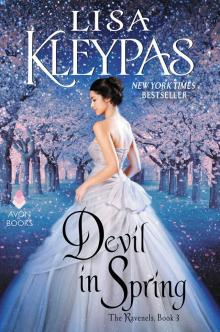 Devil in Spring
Devil in Spring Sugar Daddy
Sugar Daddy Devil in Winter
Devil in Winter Dreaming of You
Dreaming of You Christmas Eve at Friday Harbor
Christmas Eve at Friday Harbor Love, Come to Me
Love, Come to Me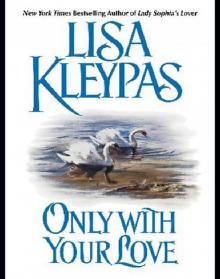 Only With Your Love
Only With Your Love Suddenly You
Suddenly You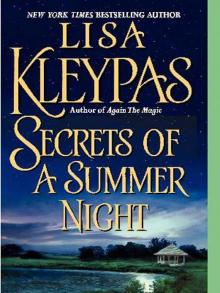 Secrets of a Summer Night
Secrets of a Summer Night Cold-Hearted Rake
Cold-Hearted Rake Where's My Hero?
Where's My Hero? Gifts of Love
Gifts of Love Married by Morning
Married by Morning Then Came You
Then Came You Wish List
Wish List Where Dreams Begin
Where Dreams Begin A Historical Christmas Present
A Historical Christmas Present Somewhere I'll Find You
Somewhere I'll Find You Scandal in Spring
Scandal in Spring Someone to Watch Over Me
Someone to Watch Over Me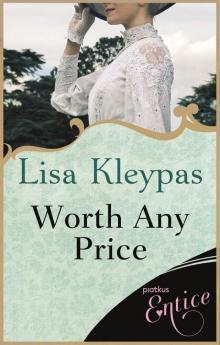 Worth Any Price
Worth Any Price Prince of Dreams
Prince of Dreams It Happened One Autumn
It Happened One Autumn Love in the Afternoon
Love in the Afternoon Devil's Daughter
Devil's Daughter A Wallflower Christmas
A Wallflower Christmas Tempt Me at Twilight
Tempt Me at Twilight Brown-Eyed Girl
Brown-Eyed Girl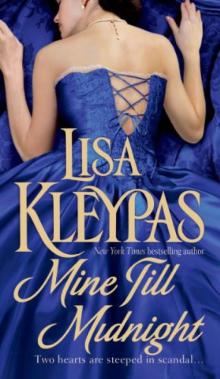 Mine Till Midnight
Mine Till Midnight Again the Magic
Again the Magic Lady Sophia's Lover
Lady Sophia's Lover Because You're Mine
Because You're Mine Midnight Angel
Midnight Angel Smooth-Talking Stranger
Smooth-Talking Stranger Blue-Eyed Devil
Blue-Eyed Devil Hello Stranger
Hello Stranger Dream Lake
Dream Lake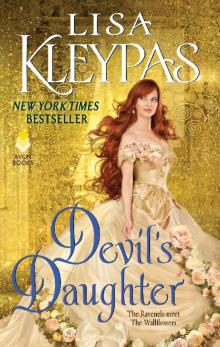 Devil's Daughter: The Ravenels Meet the Wallflowers
Devil's Daughter: The Ravenels Meet the Wallflowers A Christmas to Remember
A Christmas to Remember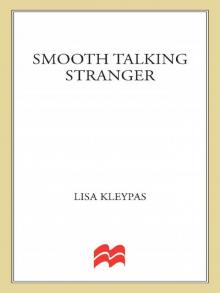 Smooth Talking Stranger
Smooth Talking Stranger Crystal Cove
Crystal Cove Marrying Winterborne
Marrying Winterborne Stranger in My Arms
Stranger in My Arms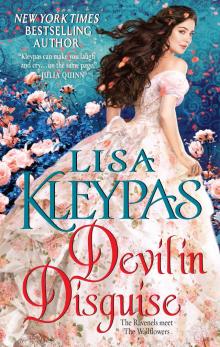 Devil in Disguise
Devil in Disguise Worth Any Price bsr-3
Worth Any Price bsr-3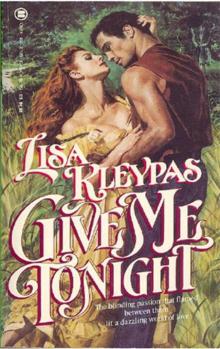 Give Me Tonight
Give Me Tonight Rainshadow Road fh-2
Rainshadow Road fh-2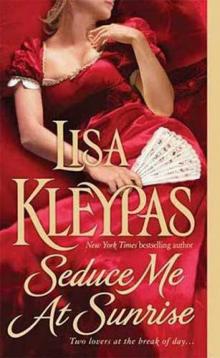 Seduce Me At Sunrise
Seduce Me At Sunrise I Will
I Will Someone to Watch Over Me bsr-1
Someone to Watch Over Me bsr-1 Lady Sophias Lover bsr-2
Lady Sophias Lover bsr-2 A Hathaway Wedding
A Hathaway Wedding A Hathaway Wedding (Hathaways Bk2.5)
A Hathaway Wedding (Hathaways Bk2.5) Worth Any Price - Bow Street 3
Worth Any Price - Bow Street 3 Christmas with Holly
Christmas with Holly